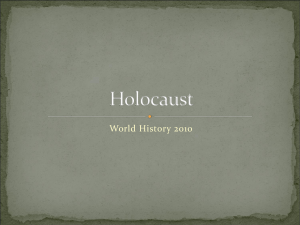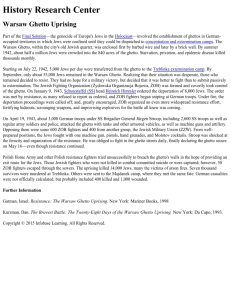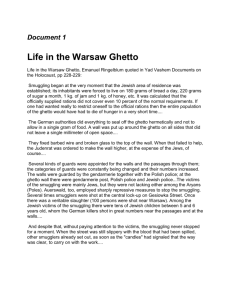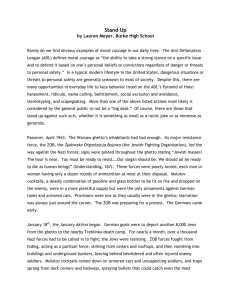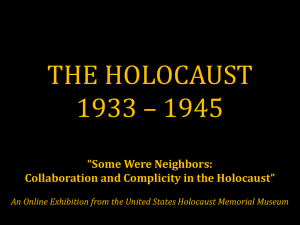Suggested Readings for Holocaust Memorial Day 2016 Don't Stand By
advertisement
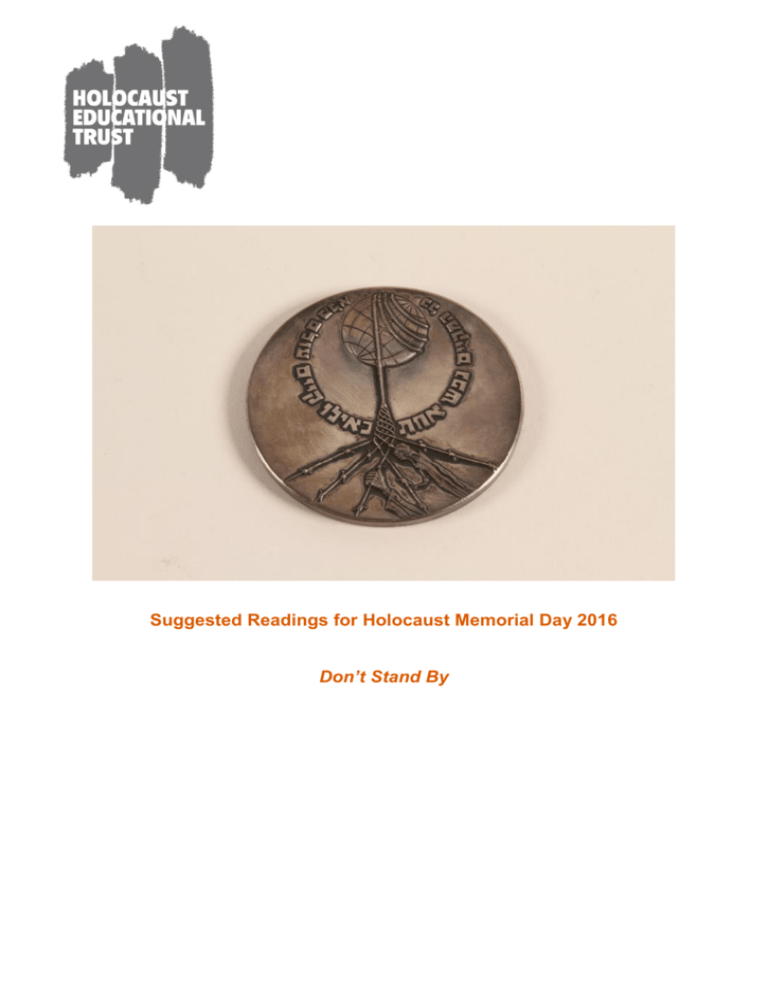
Suggested Readings for Holocaust Memorial Day 2016 Don’t Stand By Introduction These readings are provided for possible use in commemorative events, whether in schools or in the wider community, for Holocaust Memorial Day 2016. This year’s theme is Don’t Stand By and this is directly addressed, in different forms, by the first nine texts, which encompass the themes of ‘bystanders’, rescue and resistance. The last four readings, meanwhile, highlight the broader questions of loss and remembrance which form an essential focus of Holocaust Memorial Day At the same time, the readings are appropriate for a classroom setting. They can be used in a number of subjects to facilitate discussion of key issues arising from the Holocaust. In History and English especially, the poems represented here could additionally be used to explore the value and possible limitations of literature as historical evidence. It is also worth stressing that many of the poems are works of great literary merit. The texts represent a range of literary styles with varying levels of complexity so teachers should naturally decide which are appropriate to different age and ability groups. Brief background notes for each reading are provided at the end of this document. Cover image: Righteous Among the Nations medal; Righteous Among the Nations is a title awarded by Yad Vashem, Israel’s national Holocaust museum and remembrance authority, to non-Jews who risked their lives to save Jews during the era of the Holocaust. You Onlookers Whose eyes watched the killing. As one feels a stare at one’s back You feel on your bodies The glances of the dead. How many dying eyes will look at you When you pluck a violet from its hiding place? How many hands will be raised in supplication In the twisted martyr-like branches Of old oaks? How much memory grows in the blood Of the evening sun? O the unsung cradlesongs In the night cry of the turtledove— Many a one might have plucked stars from the sky, Now the old must well do it for them! You onlookers, You who raised no hand in murder, But who did not shake the dust From your longing, You who halted there, where dust is changed To light. Nelly Sachs Refugee Blues Say this city has ten million souls, Some are living in mansions, some are living in holes: Yet there's no place for us, my dear, yet there's no place for us. Once we had a country and we thought it fair, Look in the atlas and you'll find it there: We cannot go there now, my dear, we cannot go there now. In the village churchyard there grows an old yew, Every spring it blossoms anew: Old passports can't do that, my dear, old passports can't do that. The consul banged the table and said, ‘If you've got no passport you're officially dead’: But we are still alive, my dear, but we are still alive. Went to a committee; they offered me a chair; Asked me politely to return next year: But where shall we go to-day, my dear, but where shall we go to-day? Came to a public meeting; the speaker got up and said; ‘If we let them in, they will steal our daily bread’: He was talking of you and me, my dear, he was talking of you and me. Thought I heard the thunder rumbling in the sky; It was Hitler over Europe, saying, ‘They must die’: O we were in his mind, my dear, O we were in his mind. Saw a poodle in a jacket fastened with a pin, Saw a door opened and a cat let in: But they weren't German Jews, my dear, but they weren't German Jews. Went down the harbour and stood upon the quay, Saw the fish swimming as if they were free: Only ten feet away, my dear, only ten feet away. Walked through a wood, saw the birds in the trees; They had no politicians and sang at their ease: They weren't the human race, my dear, they weren't the human race. Dreamed I saw a building with a thousand floors, A thousand windows and a thousand doors: Not one of them was ours, my dear, not one of them was ours. Stood on a great plain in the falling snow; Ten thousand soldiers marched to and fro: Looking for you and me, my dear, looking for you and me. W. H. Auden Nobel acceptance speech, 1986 I remember: it happened yesterday or eternities ago. A young Jewish boy discovered the kingdom of night. I remember his bewilderment, I remember his anguish. It all happened so fast. The ghetto. The deportation. The sealed cattle car. The fiery altar upon which the history of our people and the future of mankind were meant to be sacrificed. I remember: he asked his father: "Can this be true?" This is the twentieth century, not the Middle Ages. Who would allow such crimes to be committed? How could the world remain silent? And now the boy is turning to me: "Tell me," he asks. "What have you done with my future? What have you done with your life?" And I tell him that I have tried. That I have tried to keep memory alive, that I have tried to fight those who would forget. Because if we forget, we are guilty, we are accomplices. And then I explained to him how naive we were, that the world did know and remain silent. And that is why I swore never to be silent whenever and wherever human beings endure suffering and humiliation. We must always take sides. Neutrality helps the oppressor, never the victim. Silence encourages the tormentor, never the tormented. Sometimes we must interfere. When human lives are endangered, when human dignity is in jeopardy, national borders and sensitivities become irrelevant. Wherever men or women are persecuted because of their race, religion, or political views, that place must – at that moment – become the centre of the universe. Elie Wiesel Protest! In the Warsaw Ghetto, behind a wall that is cutting them off from the world, several hundred thousand condemned people await death. No hope of survival exists for them, and no help is coming from anywhere… All perish: the rich and poor, the old, the women, the men, the youth, the babies… The world looks upon this murder, more horrible than anything history has ever seen, and stays silent. The slaughter of millions of defenceless people is being carried out amid general sinister silence… The perishing Jews are surrounded by Pilates who deny all guilt. This silence can no longer be tolerated. Whatever the reason for it, it is vile. In the face of murder it is wrong to remain passive. Whoever is silent witnessing murder becomes a partner to the murder. Whoever does not condemn, consents… We do not want to be Pilates… we protest from the bottom of our hearts filled with pity, indignation and horror. This protest is demanded of us by God, who does not allow us to kill… Every being calling itself human has the right to love his fellow man. Zofia Kossak-Szczucka, Warsaw, August 1942 1980 And when I go up as a pilgrim in winter, to recover the place I was born, and the twin to self I am in my mind, then I'll go in black snow as a pilgrim to find the grave of my saviour, Yanova. She'll hear what I whisper, under my breath: Thank you. You saved my tears from the flame. Thank you. Children and grandchildren you rescued from death. I planted a sapling (it doesn't suffice) in your name. Time in its gyre spins back down the flue faster than nightmares of nooses can ride, quicker than nails. And you, my saviour, in your cellar you'll hide me, ascending in dreams as a pilgrim to you. You'll come from the yard in your slippers, crunching the snow so I'll know. Again I'm there in the cellar, degraded and low, you're bringing me milk and bread sliced thick at the edge. You're making the sign of the cross. I'm making my pencil its pledge. Abraham Sutzkever The rescue of the Jews of Denmark The small crowd that gathered in Lyngby on the night of 2nd October, the night of the raids, with the decision to send the endangered Jews to Sweden, knew nothing about resources or options, and what they thought they knew turned out to be wrong… We lived inland, far from suitable harbours. We had no special knowledge of the coast, knew nothing of sailing, had no connections with the fishermen and skippers, had no money to pay with, and had not as much as a dinghy to sail with, since the Germans had long since ordered all boats not used for commercial purposes away from the coast. The legal government had been ousted, all of the organs of executive authority were under German control, and despite their best will, we could only count on limited support from the police… But one thing is certain...: If the helpers of Jews had no other assets, we had the wish to help these people. Aage Bertelsen The last letter of Youra Livchitz Dear Mother, Although the words are powerless to express all that I feel, I leave this cell to go to the other side of life with calm – a calm that is also resignation in the face of the inevitable. To tell you that I regret all that has happened would serve no purpose. I very much regret not being there to help to support you in the first trial – that which you have already suffered: Choura [Youra’s brother who had already been executed]. I wanted to be there so that the two of us could struggle with the world as it is. Dear Mother, do not cry too much thinking about your little one. My life has been full first and foremost of errors. I think of all our friends who are in prison and ask their forgiveness. Remember me without sorrow. I have had the best, most excellent companions until the end and even now I do not feel alone. My best wishes to all. Dear Mother, I have to say goodbye, time passes. Once again, it is not the last moments that have been the hardest. Have confidence and courage in life, time erases many things. Think of us as dead on the front, think of all the families, all the mothers affected by the war, the war that we had all believed would finish earlier. Your loving son, Youra Youra Livchitz, Breendonk fortress, February 1944 From a manifesto of the Jewish Combat Organisation Poles, citizens, freedom fighters! From out of the roar of the cannon with which the German army is battering our homes, the dwellings of our mothers, children, and wives; From out of the reports of machine-guns which we have captured from the cowardly police and SS men; From out of the smoke of fires and the blood of the murdered Warsaw Ghetto, we – imprisoned in the ghetto – send you our heartfelt fraternal greetings…. A battle is being waged for your freedom and ours. For your and our human, civic, and national honour and dignity. We shall avenge the crimes of Auschwitz, Treblinka, Bełżec, Majdanek! Long live the brotherhood of arms and blood of fighting Poland! Long live freedom! Jewish Combat Organisation, Warsaw, 23rd April 1943 The last testament of David Graber I would love to live to see the moment in which the great treasure will be dug up and shriek to the world proclaiming the truth. So the world may know all. So the ones who did not live through it may be glad, and we may feel like veterans with medals on our chest. We would be the fathers, the teachers and educators of the future… But no, we shall certainly never live to see it, and therefore do I write my last will. May the treasure fall into good hands, may it last into better times, may it alarm and alert the world to what happened and was played out in the twentieth century… We may now die in peace. We fulfilled our mission. May history attest for us. David Graber, Warsaw, 3rd August 1942 Monument For heroes – poems, rhapsodies!!! For heroes the homage of posterity, their names engraved on plinths and a monument of marble. For valiant soldiers – medals! For soldiers’ deaths a cross! Conjure the glory and suffering into steel, granite and bronze. Legends will remain after the great, that they were colossal, The myth will congeal and – become THE MONUMENT. But who will tell you, future generations, not about bronze or mythic themes – but that they took her – killed her, and that she is no more … Was she good? Not really – she often quarrelled after all, slammed the door, scolded… but she was. Pretty? She was never pretty, even before her hair silvered. Wise? Well, quite ordinary, not stupid… But… she was. Understand – she was, and now when she is not, every corner here has evil eyes and immediately sees that she is no more. Władysław Szlengel Toys My daughter, you must care for your toys, Poor things, they’re even smaller than you. Every night, when the fire goes to sleep, Cover them with the stars of the tree. Let the golden pony graze The cloudy sweetness of the field. Lace up the little boy’s boots When the sea-eagle blows cold. Tie a straw hat on your doll And put a bell in her hand. For not one of them has a mother, And so they cry out to God. Love them, your little princesses— I remember a cursed night When there were dolls left in all seven streets Of the city. And not one child. Abraham Sutzkever The Jewish Shtetl And once, there was a garden, and a child, and a tree. And once, there was a father, and a mother, and a dog. And once, there was a house, and a sister, and a grandma. And once, there was life. Anonymous Shema You who live secure In your warm houses, Who return at evening to find Hot food and friendly faces: Consider whether this is a man, Who labours in the mud Who knows no peace Who fights for a crust of bread Who dies at a yes or a no. Consider whether this is a woman, Without hair or name With no more strength to remember Eyes empty and womb cold As a frog in winter. Consider that this has been: I commend these words to you. Engrave them on your hearts When you are in your house, when you walk on your way, When you go to bed, when you rise. Repeat them to your children. Or may your house crumble, Disease render you powerless, Your offspring avert their faces from you. Primo Levi Notes on the readings ‘You Onlookers’ Nelly Sachs (1891-1970) was born into an assimilated Jewish family in Berlin. Although she wrote poetry from an early age, her reputation as a writer rests on the poems and plays she produced following her flight, with her elderly mother, from Nazi persecution to Sweden in May 1940; she remained in Sweden after the war, taking citizenship in 1952. Her first volume of poetry, In den Wohnungen des Todes (In the Houses of Death), published in 1947, addressed Jewish suffering both in the Holocaust and earlier in history through vivid use of metaphor, a pattern repeated and developed in later works. She was jointly awarded the Nobel Prize for Literature in 1966 with the Israeli writer Shmuel Yosef Agnon. ‘You Onlookers’, taken from In den Wohnungen des Todes, bitterly admonishes those who took no part in the murder process but did nothing to stop it, in effect asking them what they did (or did not do) during the Holocaust but also what they have done since. The implication of the poem, which is more evident in the grammar of the German original, extends the impetus to scrutinise one’s conscience and actions beyond the 1940s to all readers. ‘Refugee Blues’ W. H. Auden (1907-1973) was one of the greatest English language poets of the twentieth century. His strong political commitment – he briefly served in the Spanish Civil War in 1937 – was reflected in many of his poems in the 1930s. ‘Refugee Blues’ was written in New York in March 1939 and addresses the fate of Jewish refugees from Germany, often through vivid comparisons to the natural world. The poem particularly highlights the frequent indifference or hostility of the governments and citizens of the countries in which German Jews sought refuge. In the seventh stanza, Auden makes direct reference to Hitler’s famous speech of 30th January 1939 which ‘prophesied’ that world war would lead to “the annihilation of the Jewish race in Europe”. (It is important for students to understand that this poem was written before the outbreak of war and the start of the Holocaust.) Although ‘Refugee Blues’ is a rather lengthy poem, its rhythms – the poem was one of several written by Auden in the late 1930s that drew inspiration from blues music – and direct language encourage comprehension. Nobel acceptance speech, 1986 Elie Wiesel (1928- ) was born in Sighet (now Sighetu Marmaţiei in Romania). He was deported to Auschwitz-Birkenau together with his family and the rest of his community in May 1944 following the German invasion of Hungary. His mother and youngest sister Tzipora were murdered on arrival in Birkenau; his father died in Buchenwald in January 1945 days after he and Elie had arrived in the camp following a death march. Elie Wiesel first recounted his experiences in Un di Velt Hot Geshvign (And the World Remained Silent), a 900-page Yiddish memoir, which formed the basis for Night (first published in French in 1958) which has become one of the best-known and most haunting of Auschwitz testimonies. Wiesel was awarded the Nobel Peace Prize in 1986 as a testament to his tireless campaigning to preserve the memory of the Holocaust and to raise awareness of more recent genocides. These powerful words are taken from his acceptance speech. Protest! Zofia Kossak-Szczucka (1889-1968) was born into a prominent family of Polish artists and political activists. She became a well-known writer in the interwar period and was allied to Catholic, nationalist and antisemitic movements. Following the German invasion of Poland, she became an active member of the underground resistance. Despite her antisemitism, Kossak-Szczucka was so repelled by the deportations from the Warsaw Ghetto to Treblinka extermination camp in the summer of 1942 that she wrote the leaflet Protest!, of which 5,000 copies were illegally produced. Kossak-Szczucka did more than condemn the passivity of the world in the face of unprecedented mass murder; in September 1942, she co-founded the Provisional Committee to Aid Jews which sought to provide hiding places and support for fugitive Jews. In December of the same year, the Provisional Committee evolved into Żegota, an arm of the Polish underground state which helped thousands of Jews in occupied Poland, especially in Warsaw. Kossak-Szczucka was arrested in 1943 and sent to Auschwitz but subsequently released, enabling her to participate in the Warsaw Uprising in 1944. She escaped to Britain following the imposition of a Communist regime in 1945 but returned to Poland in 1957 during the political liberalisation which followed Stalin’s death. She was posthumously honoured as a Righteous Among the Nations by Yad Vashem in 1985. ‘1980’ Abraham Sutzkever (1913-2010) was born in modern Belarus and grew up in Vilna (then Wilno in Poland, now Vilnius in Lithuania) where he became a leading member of the Yung Vilné (Young Vilna) group of Yiddish poets and artists. Following the creation of the Vilna Ghetto in September 1941, Sutzkever’s poems recorded the realities of ghetto life whilst also urging Jews to resist. In this poem, written in the titular year, Sutzkever pays tribute to Zofia Bartoszewicz, a Polish woman who – with her husband Jan – sheltered the poet following his escape from the Vilna Ghetto in early 1943. (Zofia was known as Yanova, meaning ‘wife of Jan’.) Zofia also provided medical help for Sutzkever when he fell ill and smuggled food into the ghetto for his family. After Sutzkever was spotted by a neighbour, he decided to return to the ghetto to avoid the risk of denunciation which would have led not only to his own death but also those of Jan and Zofia. Just days before the ghetto’s final destruction in September 1943, Sutzkever and his wife escaped and joined the Jewish partisan movement in the forests around Vilna. They settled in Israel after the war. Sutzkever’s moving declaration of a survivor’s obligation to honour his rescuer reminds us of the importance of preserving the memory of the courageous minority of individuals who chose to offer assistance to Jews, often at great personal risk to themselves. The writer was responsible for Jan and Zofia being awarded the title Righteous Among the Nations by Yad Vashem, marked by the planting of a tree in Jerusalem referred to in the final line of the second stanza. The reference in the fourth stanza to “crunching the snow / so I’ll know” relates to the practice of many rescuers of using a special signal so that the person in hiding knew when they were approaching. The rescue of the Jews of Denmark Aage Bertelsen (1901-1980) was an educator who was the head of a school in Lyngby in eastern Denmark. He played a prominent role in organising perhaps the most spectacular example of the rescue of Jews during the Holocaust: the successful smuggling of almost all Danish Jews to the safety of neutral Sweden in October 1943. After Nazi plans to deport the Jews to the East were leaked, the Danish Resistance hastily improvised hiding places and a flotilla of fishing boats, rowing boats and even canoes to make the passage. Around 7,200 Jews were thereby ferried to safety along with 680 non-Jewish family members. Fewer than 500 Jews were apprehended by the Nazis. They were deported to the Terezín Ghetto yet all but 51 survived the war, largely as a result of pressure on the Germans from Danish officials to ensure that they were well-treated. Although the comparatively small size of Denmark’s Jewish population perhaps made its rescue easier than in other countries, it nonetheless relied on the goodwill and activism of many members of society, such as Aage Bertelsen, who was himself forced to take the same journey across the Øresund to Sweden in November 1943 to escape the Gestapo. A strong pacifist, Bertelsen continued to campaign for humanitarian causes after the war. The last letter of Youra Livchitz Youra Livchitz (1917-1994) was born into a Jewish family in Kiev. After his parents separated in 1928, his mother emigrated with her two sons to Belgium, where Youra qualified as a doctor. He became an active member of the Belgian Resistance following the German invasion of 1940. On 19th April 1943, the same day that the Warsaw Ghetto Uprising began, Youra and two non-Jewish friends - armed only with a pistol, a pair of wire cutters, and a lamp covered in red paper to make it look like a stop signal – succeeded in stopping a train carrying 1,631 Jews from the Mechelen transit camp to Auschwitz-Birkenau. Their actions helped 231 people to get off the train of whom 115 successfully escaped. The youngest survivor was an 11-yearold boy. Youra was subsequently betrayed to the Gestapo and arrested in May 1943. He managed to escape but was again arrested, with his brother Choura who was also a resistance fighter, in the following month. Both brothers were executed in February 1944. Youra wrote this last letter to his mother from his prison cell. From a manifesto of the Jewish Combat Organisation The Jewish Combat Organisation (Żydowska Organizacja Bojowa or ŻOB) was founded in the Warsaw Ghetto by members of socialist and Zionist youth groups in the summer of 1942, during the Great Aktion in which close to a quarter of million Jews were deported from the ghetto to their deaths at Treblinka. Lacking weapons and military experience, there was little that the ŻOB could do to stop the deportations at that stage. However, following the cessation of the Aktion in September, the organisation spent the autumn of 1942 building up its forces and establishing links with the Polish underground. After skirmishes with the SS during a small-scale Aktion in January 1943, the ŻOB launched the Warsaw Ghetto Uprising when the Germans entered the ghetto on 19th April 1943 to begin its final liquidation. Although the ŻOB’s leaders had no illusions of defeating the occupiers, they kept German forces pinned down for almost a month in the first major civilian revolt anywhere in Nazi-occupied Europe. Most of the fighters died during the course of the uprising. This manifesto, issued in the first week of the uprising, was addressed to Poles beyond the ghetto walls, and by implication to the wider world. The phrase “for your freedom and ours” would have been familiar to any Pole, having been adopted in the nineteenth century by Polish insurrectionists to highlight the commonality of Poland’s struggles for independence and those of other oppressed nations. The extent to which the Polish underground offered – and was able to offer – an appropriate response to the ŻOB’s struggle has remained a source of debate since 1943. Nonetheless, the manifesto stands as a testament to the idealism and sacrifice of the young people who chose to fight for their dignity against almost unimaginable odds. The last testament of David Graber David Graber (1923-1942/3) was one of three socialist Zionist activists entrusted with the burial of the Oneg Shabbat archive during the mass deportations from the Warsaw Ghetto to Treblinka in the summer of 1942. Oneg Shabbat was a project initiated by the historian Emanuel Ringelblum which sought to record Jewish life in occupied Warsaw through the collection of thousands of items including diaries, letters, official papers, statistical questionnaires and even apparently mundane objects such as sweet wrappers. The aim was to compile materials which could form the basis of post-war histories which Ringelblum and others intended to write. When it became clear that Warsaw’s Jews would not survive, the archive took on a different dimension, as a memorial to the agony of the ghetto. Graber and his colleagues buried the first cache of materials in metal boxes in the grounds of a former school in the ghetto. He died at some point between the writing of this document on 3rd August 1942 and the suppression of the Warsaw Ghetto Uprising in May 1943. This powerful extract from Graber’s final note, buried with the archive, stands as a memorial to the courage and commitment of the men who buried the archives and to the importance of Oneg Shabbat itself. His wishes were at least partially fulfilled with the discovery of two of the three caches after the war (only charred pages from a diary were found from the third collection). The archive, now housed in the Jewish Historical Institute in Warsaw, has become the most important source for the study of Jewish life during the Holocaust. The reading also invites students to consider the how the recording of Nazi crimes and preservation of Jewish culture can be seen as an act of resistance. ‘Monument’ Władysław Szlengel (1914-1943) was a leading Polish Jewish poet who, rather unusually, wrote in Polish rather than Yiddish. When the war broke out, Szlengel was working in a theatre in Białystok (a city which was occupied by the Soviets in September 1939) but, concerned by the fate of his wife who had remained Warsaw, he chose to return to the Polish capital in 1940. Following the creation of the Warsaw Ghetto in November 1940, Szlengel became one its leading cultural activists. His poems, which recorded the struggles of daily life in the ghetto, were written for a public audience and were widely performed or passed on by word of mouth. He and his wife were killed during the Warsaw Ghetto Uprising in the spring of 1943. This reading consists of the first stanzas of Szlengel’s poem ‘Monument’, which was written following the deportation of close to quarter of a million Jews from the ghetto to Treblinka in less than two months in the late summer of 1942. The poem’s contrast of the honours bestowed on fallen ‘heroes’ and the overlooked fate of an apparently unremarkable Jewish mother serves to encourage us to remember the humanity of those millions of ‘ordinary’ people who fell victim to the Holocaust. ‘Toys’ This second poem by Abraham Sutzkever, written in Israel in 1956, is a moving elegy to the child victims of the Holocaust. In urging his young daughter, born after the war, to cherish her playthings, Sutzkever evokes the memory of the children of the Vilna Ghetto in the devastating final stanza. (The phrase “all seven streets / Of the city” is a direct reference to the ghetto, which was concentrated in a small area of Vilna’s historic Jewish quarter.) It is given added poignancy with the knowledge that Sutzkever’s own newborn son was murdered by the Nazis in 1942. ‘The Jewish Shtetl’ This simple but affecting poem, written by an unknown author, reminds us that the Holocaust represented the destruction of communities and cultures which had existed for centuries as well as of individuals and families. ‘Shtetl’ is a Yiddish word, typically used to denote a small town with a majority Jewish population in eastern Europe. Such communities existed across Poland, Lithuania and the Soviet Union in the pre-war era; all were destroyed in the Holocaust. ‘Shema’ Primo Levi (1919-1987) was a Jewish chemist from Turin. After an ill-fated attempt to establish a partisan group, Levi and a group of friends were arrested in late 1943. When he revealed his Jewish identity, believing that this would save him from execution as a partisan, Levi was sent to the Fossoli di Carpi transit camp and from there, in February 1944, to Auschwitz. Levi was selected to work in Auschwitz III (Monowitz), the large camp attached to IG Farben’s Buna chemical factory, where he remained until liberation in January 1945; ironically, he was saved by a bout of scarlet fever which meant that he was left behind when the SS evacuated the camp thereby sparing him the horrors of the death marches. In 1947, he published If This Is a Man, perhaps the best-known and most powerful Auschwitz memoir. The Holocaust continued to haunt much of Levi’s literary output in the following decades and contributed to the periodic bouts of depression which he suffered until his death (officially ruled as suicide) in 1987. ‘Shema’ was first published as the introduction to If This Is a Man. The Shema is a Jewish prayer declaring the singularity of God which is the centrepiece of prayer services. Levi, a lifelong atheist, adapts elements of the prayer to instead invite us to consider the humanity of the victims of Auschwitz and to remind us of the importance of memory.
